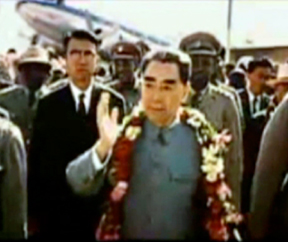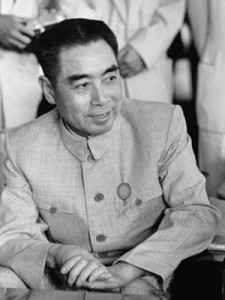
Premier Zhou Enlai arrives at the Bandung Conference
in Indonesia (1955) to announce the Five Principles of Peace.
The Five Principles
of Peace
The Five Principles of Peace were first written by Premier Zhou Enlai of China on December 31, 1953. The Principles are:
1) Mutual respect for each nation’s territorial integrity and sovereignty
2) Mutual non-aggression
3) Mutual non-interference in each other’s internal affairs
4) Equality and mutual benefit
5) Peaceful co-existence
These words were written at a time when people everywhere were weary of decades of world war, civil war, invasion and occupation. Major cities around the world lay in ruins, re-building from conflict; millions of refugees sought new homes. Hunger, poverty and sickness cut down the young. The flower of an entire generation had been sacrificed, and more war loomed. Billions of people sought encouragement.
They asked — could there be an end to the violence and destruction?
Zhou Enlai’s simple answer was — there are some fundamentals that we can agree upon, among the nations of the world. He acknowledged — we have profound differences in ideology, economics, social policy, in our religious, cultural and racial identities. He drafted the Five Principles, and found a ready audience.
He stated: “If these principles were applied not only between various countries but also in international relations generally, they would form a solid foundation for peace and security, and the fears and apprehensions that exist today would give place to a feeling of confidence…”
On April 29 1954, the Principles were published for the first time, as part of the introduction to a trade and communications agreement regarding Tibet, between the People’s Republic of China and India. This treaty was later adopted and registered by the United Nations.
 The Five Principles were published and discussed at many more events — in Delhi, Bandung, Geneva and Cairo. They were ultimately signed and ratified by 57 countries, members of the Non-Aligned Movement, and have been incorporated in the charter of the World Trade Organization.
The Five Principles were published and discussed at many more events — in Delhi, Bandung, Geneva and Cairo. They were ultimately signed and ratified by 57 countries, members of the Non-Aligned Movement, and have been incorporated in the charter of the World Trade Organization.
The five principles were distilled from most fundamental ideas of international affairs, and are drawn from the Covenants of the League of Nations, the Brand-Kellogg Treaty, and the United Nations Charter. They are also based on traditional principles of Chinese philosophy, which date back nearly 2600 years to Lao-Tse and Confucius.
The contribution of Zhou Enlai was to identify these principles, simplify them into five brilliant points, then to harmonize and explain them. And he persuaded many governments and public institutions to accept them.
The importance of observing the Five Principles today is amplified by several complex world events — including the disbanding of the Soviet Union, the growth of multilateralism, the increasing participation of business, the private sector and non-profit organizations in international affairs, the practice of international law, the spread of globalization, the role of the United States as a military, economic and social peacekeeper, and the re-emergence of China as a world power.
Today, decades after they were first written, the Five Principles of Peace are more important than ever — to understand, study, extend and practice.
The Principles can be extended from the political sphere to the personal and psychological; to the family, the community, to each nation. Wherever people perceive, care and interact, the Five Principles can help to establish basic standards that will make our hearts, our lives, our relationships, our businesses, cities and nations more peaceful.
The world is weary of war, and is finally ready for profound, lasting change.
This was the purpose of the Celebration of the Five Principles of Peace, hosted by the Zhou Enlai Peace Institute at the National People’s Congress in Beijing.
Zhou Enlai Peace Institute; Beijing and Honolulu; June, 2013
Download an article on the Five Principles of Peace


